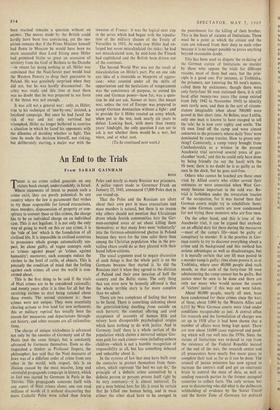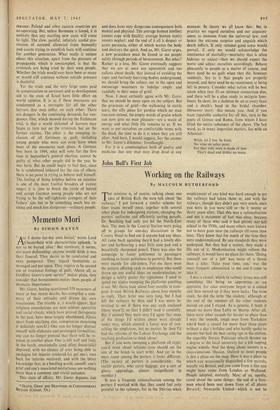An End to the Trials
From SARAH GAINHAM
BONN
THERE is no crime called genocide on any statute book except, understandably, in Israel. Where statements of intent to punish such a crime exist, they are purely polemical. In any country where the law is paramount that wishes to try those responsible for forced evacuations, mass murders, dispossession of property or con- spiracy to commit these or like crimes, the charge has to be an individual charge on an individual case. This is not legalism; it is not only the only way of going to work on this or any crime, it is the 'rule of law' which is the foundation of all civilised life. It is impossible in civilised countries to pronounce whole groups automatically sus- pect, let alone guilty, of vague concepts such as 'crimes against peace' or 'crimes against humanity'; moreover, such concepts reduce the victims to the level of cattle, of objects. This is precisely the condition of mind that the feeling against such brimes all over the world is con- cerned about.
This is the first thing to be said if the trials of Nazi crimes are to be considered rationally; and twenty years after it is time for all but the surviving victims to start being rational about these events. The second statement is: these crimes were not unique. They were essentially clearing actions to free land for new settlement; this or military reprisal has usually been the reason for massacres and deportations through- out history, and other reasons are all rationalisa- tions.
The charge of unique wickedness is advanced not only by the enemies of Germany and of the Nazis (not the same things), but is constantly advanced by Germans themselves. Even so dis- tinguished a thinker as Professor Jaspers, the philosopher, has said that the Nazi massacre of Jews was of a diffeient order of crime from any other in the world; with respect, this is an illusion caused by the most massive, long and successful propaganda campaign in history, which in fact was started by Germans in Paris in the Thirties. This propaganda concerns itself with one aspect of Nazi crimes alone; one can read millions of words of it without discovering that more Catholic Poles were killed than Jewish
Poles and nearly as many Russian war prisoners. A police report made to Governor Frank on January 25, 1943, announced 17,000 Poles shot in one round-up.
That the Poles and the Russians are silent about their own part in mass evacuations and mass murders is natural, but there is no reason why others should not mention that Ukrainians drove whole Jewish communities into the Ger- man-occupied areas or set about killing them themselves; or that many Jews went 'voluntarily' into the German-administered ghettos in Poland because they were for the time safer there than among the Christian population who in the pre- vailing chaos could do as they pleased with their hated fellow-citizens.
The usual argument used to negate discussion of such things is that the whole guilt is on the Germans because they started it. So did the Russians start it when they agreed to the division of Poland and their own invasion of half the country and the Baltic states. The only thing that can even now be honestly affirmed is that the whole terrible story is far more complex than we admit.
There are two complexes of feeling that have to be faced. There is something sickening about the generation-long dwelling from outside on such horrors; the constant offering and avid acceptance of accounts of human filth and misery have disreputable psychological origins which have nothing to do with justice. And in Germany itself there is a whole section of the population which claims a universal unique Ger- man guilt for such crimes—even including unborn children—which is not a humble recognition of responsibility at all, but has something debased and unhealthy about it.
In the systems of law that men have built over the centuries to protect themselves from them- selves, which represent 'the best we can do,' the principle of a definite crime committed by a definite person or persons proves itself right by its very constancy—it is almost universal. To put a man behind bars for life it must be certain that he killed one human being, and in mass crimes the other dead have to be avenged in the punishment for the killing of their brother. This is the basis of statutes of limitations. There must be a point at which the citizen and the state are released from their duty to each other because it is no longer possible to prove anything beyond reasonable doubt.
This has been used to dispute the re-dating of the German statute of limitations on murder by those who oppose the trials for different reasons, most of them bad ones, but the prin- ciple is a good one. For instance, at Treblinka, the prisoners, not knowing the SS men's names, called them by nicknames; though there were only forty-four SS men stationed there, it is still hard after twenty-two years (the camp existed from July 1942 to November 1943) to identify men rarely seen, and then in the sort of circum- stances imaginable when about 700,000 were gassed in that short time. At Belzec, near Lublin, only one man is known to have escaped to tell the tale; he is now over eighty and senile. The SS men lived off the camp and were almost unknown to the prisoners, whose daily 'lives' were dominated by camp trusties. How to prove any- thing? Conversely, a camp trusty brought from Czechoslovakia as a witness in the present Auschwitz trial survived several years of gas- chamber 'work,' and this he could only have done by being friendly (to say the least) with the SS men; there is no doubt he is as guilty as the men in the dock, but he goes scot-free.
. Others who cannot be touched are those once tried by Allied courts who either served their sentences or were amnestied when West Ger- many became important in the cold war. Re- trial is forbidden under the revocation treaties of the occupation, for it was feared then that German courts might try to rehabilitate them; the same German courts are now condemned for not trying these monsters who are'free men.
On the other hand, and this is true of the Auschwitz trial, it can be argued that anybody on an official duty list there during the massacres —most of the camp's life—must be guilty of conspiracy' to murder. It is the practice in Ger- man courts to try to discover everything about a crime and its background and this method has serious advantages as well as disadvantages, but it is morally certain that any SS man posted to a murder camp is guilty; time alone proves it, as at Treblinka, where over 40,000 people died each month, so that each of the forty-four SS men administering the camp cannot but be guilty. But justice must be seen to be done and there are only too many who would accuse the courts of 'victors' justice' if this way out were taken.
About 80,000 people, nearly all men, have been condemned for these crimes since the war; of these, about 5,000 by the Western Allies and 6,115 by West German courts were tried under conditions recognisable as just. A central office for research and the formulation of charges was set up in 1958 after it had been shown that a number of affairs were being kept quiet. There are now about 14,000 cases registered and pend- ing which will run well into the 1970s. Since the statute of limitations was re-dated to run from the existence of the Federal Republic instead of the end of the war, the research centre and all prosecutors have nearly five more years to complete their task as far as it can be done. The council of justice ministers has now agreed to increase the centre's staff and get an electronic brain to control the mass of data, as well as sending research parties to the former occupied countries to collect facts. The only serious bar now to discovering who did what is the deliberate withholding of evidence by the Soviet Union and the Soviet Zone of Germany for political reasons; Poland and other .eastern countries are co-operating. But, unless Bormann is found, it is unlikely that any startling new cases will come to light. The slow, painful, infinitely sordid pro- cession of accused alienated from humanity and courts trying to establish facts will continue for another generation. What really is unique about this situation, apart from the pressure of propaganda which is unexampled, is that the criminals are being tried by their own people. Whether the trials would ever have been so many or would still continue without outside pressure is doubtful.
Yet the trials and the very large sums paid in compensation to survivors and as development aid to the state of Israel have little effect on world opinion. It is as if these massacres are condemned as a surrogate for all the other horrors that men inflict on each other. There are dangers in the continuing demands for ven- geance. One, which showed during the Eichmann trial, is that a world sickened of horrors may begin to turn not on the criminals but on the former victims. The other is the sweeping in- clusion of all Germans in guilt, including young people who were not even born when most of the massacres took place. A German boy born in 1944, who will vote for. the first time in September's general election, cannot be guilty of what other people did in the year he was born. But he could begin to feel that, since he is condemned unheard for the sins of others, there is no point in trying to behave well himself. The feeling of being helpless before an injustice is one of the most fruitful breeders of violent anger; it is time to break the circle of hatred and accept German young people who are not trying to be the self-righteous avengers of their fathers' sins but to be something much less ex- citing and much less dangerous—ordinary people.



































 Previous page
Previous page